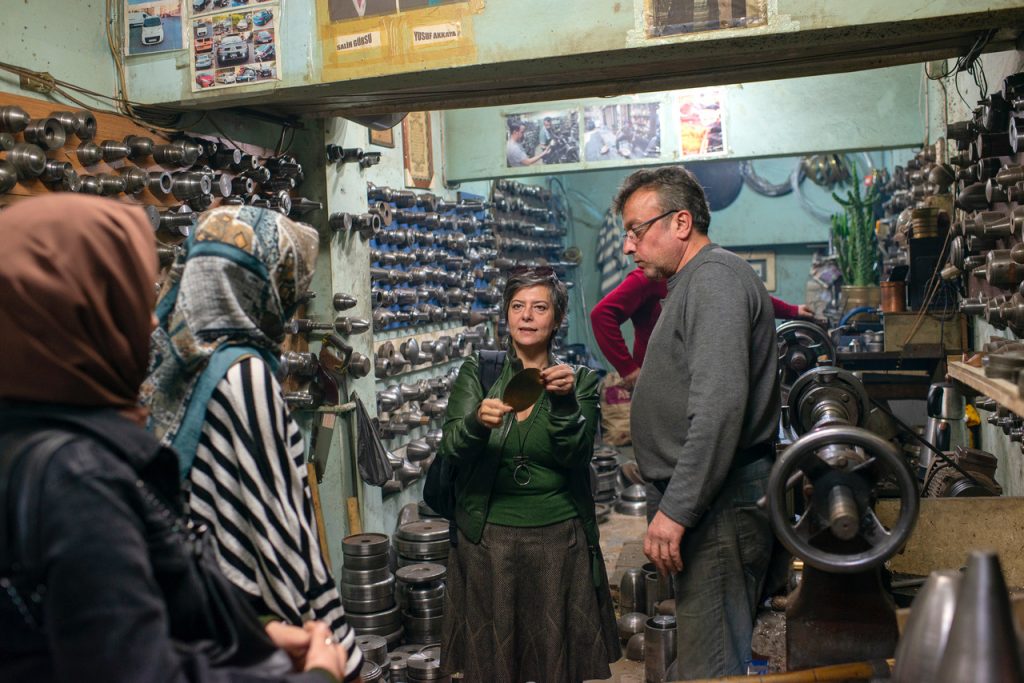Välkommen till presentationer och samtal med tre arkitekter och konstnärer, om modeller för undersökande, deltagandeprocesser, kunskapsproduktion och organisering.
Asli Kiyak, Merve Gül Özokcu och Isshaq Albarbary arbetar undersökande och kritiskt genom att placera sig och sina praktiker i nära dialog med platser, människor och sammanhang. Genom att agera organiserande och aktiverande skapar de utrymme och synlighet för att påverka och ge röst åt alternativa synsätt, idéer och motstånd.

Made in Şişhane workshop, Istanbul. Foto: Isa Simsek
Med fokus på metod får vi genom tre presentationer av projekt och ett efterföljande samtal insyn i hur dessa arkitekter och konstnärer arbetar och verkar i projekt kopplade till stadsutveckling och hantverk i Istanbul, insamlande av berättelser från kvinnor på den turkiska landsbygden, statslöshet och flyktingläger i Palestina och organiserade av alternative platser för lärande och kunskapsproduktion.
Evenemanget genomförs i samarbete mellan Röhsska museet och IASPIS och är en del av Röhsskas arkitekturdagar 2022. Alla medverkande är knutna till IASPIS residensprogram. Samtalet modereras av Magnus Ericson, IASPIS.
English
Situated Practice: Methodologies and impact
Date: Thursday 6 October 2022
Time: 4.45 – 6 PM
Place: Röhsska museet
Address: Vasagatan 37 – 39, Göteborg
Language: English
Welcome to a conversation with architects and artists about their socially engaged critical practices and models for inquiry, participatory processes, knowledge production and organisation.
Asli Kiyak, Merve Gül Özokcu and Isshaq Albarbary work investigative and critically by placing themselves and their practices in close dialogue with places, people and contexts. Contributing to organisation and activation they create space and visibility to influence and production of alternative views, ideas and resistance. With a focus on method, through three presentations of projects and a subsequent conversation, we will get an insight into how these architects and artists work and operate in projects linked to urban development and craftsmanship in Istanbul, collecting stories from women in the Turkish countryside, statelessness and refugee camps in Palestine and organising alternative sites of learning and knowledge production.
The event is organised in collaboration between Röhsska museet and IASPIS. All participants are previous or present IASPIS residents. The conversation is moderated by Magnus Ericson, IASPIS.
Aslı Kıyak İngin is an architect, designer, activist and educator based in Istanbul. Through her critical design practice she works in various fields such as design, craft, architecture, urbanism and art, with projects concerned with social, cultural and economic issues related to the city, against top down urban transformation and gentrification developments, and by advocating sustainable and participatory models for alternative visions. She has since 2006 initiated and developed the project and concept Made in Şişhane which aims for safeguarding the craft neighbourhoods in Istanbul. Against the vision and practices of displacing local production and craft in the city center, the project carries out a series of actions and sub-projects in order to keep local production and craft in place and strengthen it.
Merve Gül Özokcu is a Turkey-based architect and researcher, currently doing her PhD at Istanbul Technical University. She is a part of the collectives of Herkes İçin Mimarlık (Architecture for All) and Arazi Assembly. Her individual research, Women Narrative Spaces brings together her experience of those from participatory fieldwork and the oral history research that uses cooking together as a tool starting with her grandmother. This research is an attempt to travel with women through their geographies while daily routines reveal spaces of caring and encounter the inherent collective aspects of food. Oral history becomes a tool through which eco-feminist perspectives reveal the social reproduction of architecture. The Research path is starting from eating-cooking habits and their relationship with the place. How do the memories of cuisines interact/adapt with geography? What is shared? What is the relationship between memory, daily routines of food and space? How is it transferred to the present ? Can these conversations be a guide to strengthen commons (sharing and solidarity practices). This ongoing research sees discussing how to document routines inherent in stories and the adaptation of the changes by place and time are seen as a decolonization practice.
Isshaq Albarbary is an artist and researcher born in Beit Jibrin refugee camp, Palestine and currently working between Amsterdam and Bethlehem. His work engages the relation between art, statelessness, and extraterritoriality. His research-based practice deals with authenticity, imitations, camouflage, anonymity, normalization, and naturalization. He was a 2017/2018 fellow at BAK (basis voor actuele kunst), and previously a participant and coordinator of Campus in Camps, an educational program that activated collaborative critical learning environments in Palestinian refugee camps. He is a founding member of Al Maeishah, a communal learning environment where participants explore and practice neighbouring and hospitality as radical political acts.
Magnus Ericson is Head of IASPIS Applied Arts programme in Stockholm, Sweden. He has a background as curator and educator working across design, architecture, urbanism and art with a focus on socially engaged critical practice, pedagogy and curating. At IASPIS Magnus Ericson is responsible for the design, crafts and architecture related activities including residency programmes, developing strategic projects for international exchange and public discursive projects such as Urgent Pedagogies and Vulnerability by Design.
